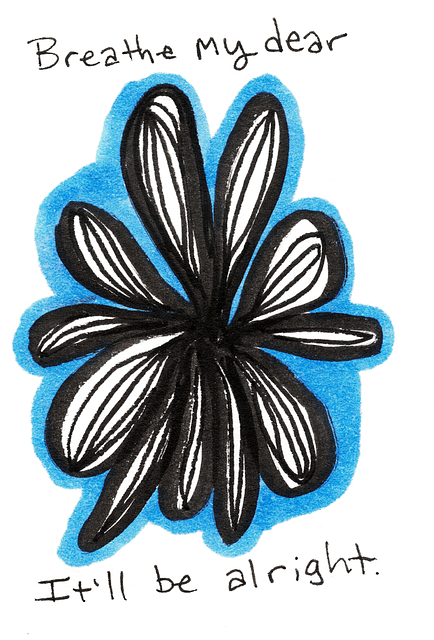Mental wellness for individuals with Superior Autism Spectrum Disorder (ASD) requires tailored approaches addressing unique cognitive and sensory processing differences, impacting emotional regulation, stress levels, and self-esteem. Effective strategies include teaching coping mechanisms, encouraging social interactions, and accommodating sensory needs. Journaling offers a powerful and personalized approach to ASD therapy, enhancing mental wellness through self-expression and reflection. Safe, structured journaling exercises guided by prompts aid in developing coping skills and cultivating self-compassion. Tailored journaling prompts, combining mindfulness and cognitive reframing, significantly enhance mental wellness practices for individuals with ASD, tracking progress, celebrating achievements, and setting achievable goals. This approach also provides a valuable outlet for healthcare providers to process emotions and experiences, promoting resilience and preventing burnout.
Mental wellness journaling offers a powerful and accessible therapeutic tool for individuals with autism spectrum disorder (ASD), helping them navigate their unique challenges. This article explores how structured journaling can enhance mental wellness, offering a safe space for expression. We delve into effective prompts, techniques, and environmental considerations tailored to ASD needs. By providing guidance on tracking progress, we emphasize the potential of journaling as a superior therapy for personal growth and self-awareness among individuals with ASD.
- Understanding Mental Wellness and Its Impact on Individuals with Autism Spectrum Disorder (ASD)
- The Power of Journaling as a Therapeutic Tool for ASD
- Creating a Safe and Supportive Journaling Environment
- Effective Journaling Prompts and Techniques for Enhancing Mental Wellness
- Tracking Progress, Celebrating Achievements: Using Journaling to Guide Personal Growth
Understanding Mental Wellness and Its Impact on Individuals with Autism Spectrum Disorder (ASD)

Mental wellness is a multifaceted aspect that encompasses emotional, psychological, and social well-being. For individuals with Autism Spectrum Disorder (ASD), navigating mental wellness can present unique challenges due to their distinct cognitive and sensory processing differences. Understanding the nuances of ASD is crucial in providing tailored therapy for superior autism spectrum disorder treatment outcomes.
People on the autism spectrum often experience heightened sensitivities, which can impact their stress levels and emotional regulation. They may require specific strategies for self-esteem improvement and stress reduction methods that cater to their unique needs. Promoting emotional well-being involves teaching them coping mechanisms, encouraging social interactions, and fostering an environment that accommodates their sensory requirements. By implementing effective techniques for emotional well-being promotion, individuals with ASD can lead fulfilling lives while managing their mental health successfully.
The Power of Journaling as a Therapeutic Tool for ASD

Journaling has emerged as a powerful therapeutic tool for individuals on the Autism Spectrum Disorder (ASD) journey, offering a unique and personal way to explore and enhance mental wellness. The act of putting thoughts and experiences onto paper can be transformative, providing an outlet for expression and self-reflection that is often difficult to access through traditional talk therapy alone. For those with ASD, who may struggle with social communication and sensory processing, journaling allows for a safe and structured space to develop coping skills and cultivate compassion towards oneself.
This practice encourages individuals to engage in regular mental wellness journaling exercise guidance, fostering self-awareness and emotional intelligence. Through guided prompts and reflective questions, journals can help individuals process complex emotions, track progress over time, and identify patterns in their experiences. By documenting challenges and successes, individuals with ASD can better understand their unique needs and develop effective strategies for managing stress and improving overall well-being. This form of self-care is a game-changer, promoting resilience and empowering folks to take charge of their mental health in a deeply personal way that complements other therapeutic practices such as compassion cultivation and coping skills development.
Creating a Safe and Supportive Journaling Environment

Creating a safe and supportive journaling environment is key to fostering mental wellness. This space should be dedicated solely to self-reflection and expression, free from judgment or interruptions. For individuals with Superior Autism Spectrum Disorder (ASD), tailoring this environment can significantly enhance therapy outcomes. Sensory considerations are paramount; choosing quiet, well-lit spaces with minimal distractions ensures comfort and focus. Incorporating familiar, soothing items like favorite books or soft toys can create a sense of security, making the journaling process more engaging and less intimidating.
This nurturing setting encourages the development of inner strength through self-discovery. It’s particularly beneficial for healthcare providers facing Burnout Prevention Strategies, as it offers a dedicated outlet for processing emotions and experiences outside of work environments. Moreover, Trauma Support Services can also utilize this practice to help individuals process and heal from past traumas, fostering resilience and a deeper understanding of their emotional landscapes.
Effective Journaling Prompts and Techniques for Enhancing Mental Wellness

Effective journaling prompts can significantly enhance mental wellness practices, especially for individuals navigating conditions like Superior Autism Spectrum Disorder (ASD). Starting with simple reflections on daily experiences and emotions can normalize self-expression and encourage emotional awareness. For instance, prompts such as “Describe a moment when you felt content today” or “What challenges did I face, and how might I handle them differently next time?” offer structured yet open avenues for exploration.
Integrating techniques like mindfulness and cognitive reframing into journaling practices can be particularly beneficial. Encouraging individuals to identify and challenge negative thought patterns, and then reframe them with more positive or realistic alternatives, promotes healthier mental states. The Healthcare Provider Cultural Competency Training emphasizes the importance of understanding individual differences when implementing Self-Care Practices, ensuring that journaling becomes a personalized tool for cultivating resilience and mental wellness within diverse communities. Community Outreach Program Implementation can further enhance access to these practices, making them accessible to a broader spectrum of individuals seeking support.
Tracking Progress, Celebrating Achievements: Using Journaling to Guide Personal Growth

Journaling can be a powerful tool to track your progress and celebrate achievements along your mental wellness journey. By documenting your thoughts, feelings, and experiences daily, you create a tangible record of your personal growth—a testament to how far you’ve come. This practice is especially beneficial for individuals with Superior Autism Spectrum Disorder (ASD) who may face unique challenges in processing emotions and communicating their experiences. Through consistent journaling, they can learn to recognize patterns, develop self-awareness, and gain valuable insights into their emotional well-being.
Moreover, journaling allows you to set achievable goals, reflect on your accomplishments, and acknowledge your progress. Celebrating these small victories can boost your self-esteem and motivate you to continue the journey towards mental wellness. For healthcare providers struggling with burnout prevention strategies, journaling can offer a private space for emotional release and self-care. It’s an effective way to process complex emotions and promote a sense of balance in their professional lives, fostering both personal growth and professional resilience.
Mental wellness journaling offers a powerful and accessible therapy for individuals with Autism Spectrum Disorder (ASD), providing a safe space for self-expression and reflection. By creating a supportive environment, utilizing effective prompts, and tracking progress, those with ASD can harness the therapeutic benefits of journaling to enhance their mental wellness and foster personal growth. This superior autism spectrum disorder therapy empowers folks to navigate their emotions, gain insights, and celebrate achievements, ultimately leading to improved overall well-being.












